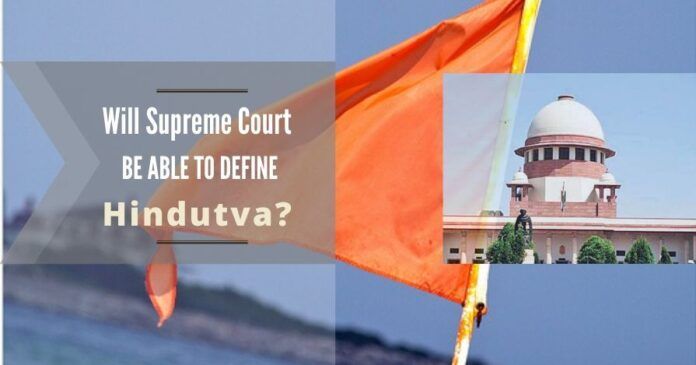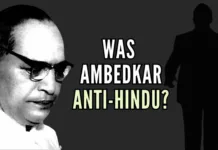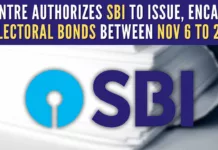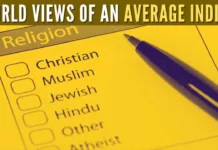
“If anybody who will prove that there is a reference to the word ‘Hindutva’, we will hear him. We will not get into ‘Hindutva’ at this stage”.Said by the court.
Once the Supreme Court settles the review plea in the Sabarimala case, it will possibly revisiting yet another contentious issue — that of defining Hindutva. How on earth is it going to do that, given that the best spiritual and religious brains have consistently maintained the impossibility of the task? Scholars have pointed out that since Hinduism is not an institutionalised form of religion — it does not have a supreme governing authority (unlike Roman Catholic Christianity which has the Pope); it does not have one god, unlike Islam which has Allah; and it does not have well-defined do’s and don’ts that serve as virtual commandments and straitjacket practices and beliefs which are the defining parameters of non-Indic religions — it is difficult to precisely define Hindu-ness, which essentially Hindutva is.
In 1976, the apex court observed that “it is a matter of common knowledge that Hinduism embraces within the self so many diverse forms of beliefs, faiths, practices and worships that it is difficult to define the term ‘Hindu’ with precision”.
Nonetheless, the apex court has more or less decided to bell the cat since Hindutva has often been used in the political sphere, with both gains and losses accumulated in the process. On previous occasions, it had to adjudicate in the matter. In one case, it maintained that Hindutva is not a religion but a way of life and those invoking it (without extraneous references) in political campaigns could not be held guilty of using religion to afore their electoral prospects and invoking provisions of the Representation of the People Act. In a subsequent case, the court refused to revisit this verdict, saying it would not go into the “larger debate” as the issue has not been mentioned in the reference made to it by another Bench. It remains to be seen if, in its third attempt, it will break fresh ground.
In December 1995, the Supreme Court had ruled, while hearing a case concerning a bunch of Shiv Sena leaders, that the mere use of the term ‘Hindutva’ or even ‘Hinduism’ in an election speech would not attract the provisions of the Representation of the People Act. It said that “no precise meaning can be ascribed to the terms ‘Hindutva’ and ‘Hinduism’ and no meaning in the abstract can confine it to the narrow limits of religion alone, excluding the content of Indian culture and heritage. It also indicated that the term ‘Hindutva’ is related more to the way of life of the people in the subcontinent”.
The three-judge bench further added, “It is difficult to appreciate how in the face of these decisions, the term ‘Hindutva’ or ‘Hinduism’ per se, in the abstract, can be assumed to mean and be equated with narrow fundamentalist Hindu religious bigotry, or be construed to fall in the prohibition in subsection(3) and/or (3A) of Section 123 (of the Representation of the People Act)”. The ruling was authored by Justice JS Verma. The apex court was hearing an appeal made by the aggrieved against a Bombay High Court order which had held them guilty of corrupt practices under the Act. Interestingly, while the court maintained that ‘Hindutva’ was a way of life and not limited to a particular religion, it also dismissed the appeals and held a few of the appellants guilty on other counts. The court’s chief opinion in these matters was given in the particular case of Dr Ramesh Yeshwant Prabhoo versus Prabhakar Kashinath Kunte[1].
In 2016, a seven-judge Bench of the apex court declined to entertain a plea by activist Teesta Setalvad, who asked the court to revisit the 1995 verdict[2]. It said that the issue had not been specifically referred to it by a five-judge Bench. It decided to skip the ‘larger debate’ and only examine the “scope and width” of Section 123(3) of the Representation of the People Act, which deals with electoral malpractices amounting to, inter alia, corrupt practices. The court said that “if anybody who will prove that there is a reference to the word ‘Hindutva’, we will hear him. We will not get into ‘Hindutva’ at this stage”. The remarks came after senior advocate KK Venugopal, appearing on behalf of one OP Gupta, requested that he be heard in case the court decided to go into the question of Hindutva. Setalvad had made an application to the court stating that religion and politics could not be allowed to be mixed, and she sought a directive from the court in this regard. The court stuck to its position that it would only look into the nexus between candidates contesting elections and religious leaders to test it against the relevant provisions of the Act.
V D Savarkar, who is credited with coining the ‘Hindutva’ term as it is understood today, also refrained from offering a precise definition, merely saying that it meant a sense of Hindu-ness.
Incidentally, back in 1966, a five-judge Constitution Bench of the Supreme Court headed by Chief Justice of India, PB Gajendragadkar had attempted to position the term ‘Hindu’ in a historical and etymological sense[3]. Writing the judgment, the Chief Justice had said, “When we think of the Hindu religion, we find it difficult, if not impossible, to define Hindu religion or even adequately describe it. Unlike other religions in the world, the Hindu religion does not claim any one prophet, it does not worship anyone god, it does not subscribe to any one dogma, it does not believe in any one philosophic concepts it does not follow anyone set of religious rites or performances. In fact, it does appear to satisfy the narrow traditional features of any religion or creed. it may broadly be described as a way of life and nothing more.”
Again, in 1976, the apex court observed that “it is a matter of common knowledge that Hinduism embraces within the self so many diverse forms of beliefs, faiths, practices and worships that it is difficult to define the term ‘Hindu’ with precision.”
Nothing about what was stated about Hinduism has changed. Thus, when defining even ‘Hindu’ is a challenge, it is doubly challenging to define ‘Hindutva’. VD Savarkar, who is credited with coining the ‘Hindutva’ term as it is understood today, also refrained from offering a precise definition, merely saying that it meant a sense of Hindu-ness. Let’s see how the Supreme Court deals with it, as and when it decides to.
Note:
1. The views expressed here are those of the author and do not necessarily represent or reflect the views of PGurus.
References:
[1] Dr. Ramesh Yeshwant Prabhoo vs Shri Prabhakar Kashinath Kunte & … on 11 December 1995 – Indiankanoon.org
[2] Supreme Court for final disposal of pleas to defreeze account of Teesta Setalvad, others – Nov 09, 2016, Indiatimes.com
[3] Sastri Yagnapurushadji And … vs Muldas Brudardas Vaishya And … on 14 January, 1966 – Indiankanoon.org











[…] expounded by modern Hindutva are already enshrined in our most cherished Constitution. The following have been the interpretations by the Supreme Court as regards the term […]
Well written article. As proclaimed by Hon’ble Supreme Court earlier Hindutwa is a way of life encompassing all aspects and essence of Sanatan Dharma. It is not a dogmatic religion unlike various other faiths. In fact it is not a religion in strict sense. Why does people like Teesta Shetalbad have problem with i Hinduism or Hindutwa when she has no qualms over political parties like Muslim League or even AIMIM which front religious affiliation as their only credential but are tolerated even by our Election Commission.
Nice article. A good beginning towards getting a well defined political framework within which we can operate. We must request Supreme Court to settle this issue for a long enough period – say 15 years – before further review.
We must also insist on details. In what permissible way can a politician refer to Hindu or hindutva? Those who blame hinduX for religious and political gains have never been pulled up by the court for wrong doing. How might they be restricted so that the debate is fair?
And much more by way of detail. If Supreme Court does that, great deal of precious time of the court will be freed up for other work.
[…] खबर को अंग्रेजी में यहाँ […]